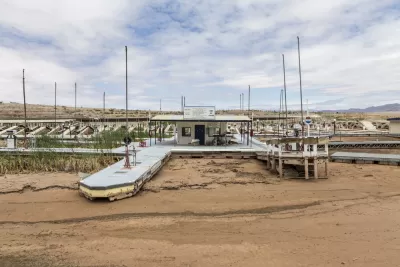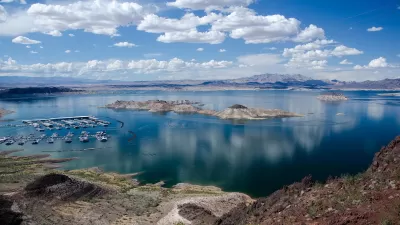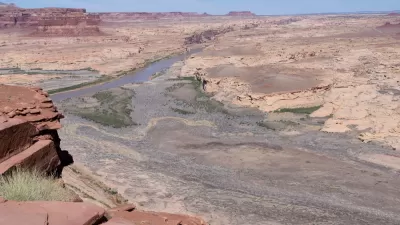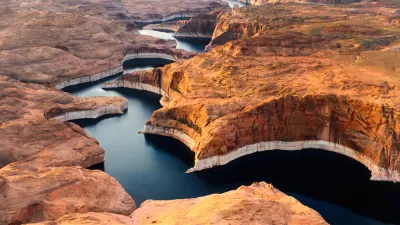Without more immediate, long-term reductions in water demand, Lake Mead and Lake Powell, the West’s most important reservoirs, face imminent collapse.

If Western states don’t make more drastic cuts to water use, Lake Powell and Lake Mead could “collapse,” writes Zak Podmore in the Salt Lake Tribune. “That’s according to a new, peer-reviewed paper published in the journal Science this week that analyzed how current agreements between basin users would fare if the 23-year trend of below-average runoff in the basin continues.”
According to the report, it “is clear that the current drought planning measures won’t cut it alone since the federal government had to enact emergency actions last April to send more water than usual into Lake Powell.”
The paper offers some recommendations based on an analysis of several scenarios. “One of many possible solutions the team identified looked at what would happen to the reservoirs if the Upper Basin states of Utah, Colorado, Wyoming and New Mexico agreed to give up water development ambitions, while the Lower Basin states of California, Arizona and Nevada, along with northwest Mexico, agreed to reductions.” If the Upper Basin limits its water use to 4 million acre-feet per year and the Lower Basin agreed to 2 million acre-feet in cuts per year, the water system could be stabilized.
Kevin Wheeler, lead author of the study, noted that if low-runoff years continue, the situation will become more dire, fast. “Last month, Bureau of Reclamation Commissioner Camille Touton announced that the seven basin states had 60 days to present plans to protect reservoir levels by making between 2 and 4 million acre-feet in water cuts by next year. Touton added that the federal government is prepared to make the reductions if the states cannot agree to a plan.”
The situation has led to tension between regions. While Lower Basin states use twice as much water as their northern neighbors, numerous projects proposed in Upper Basin states would increase their water demand. According to Wheeler, “water managers should be planning for a possible continuation of the Millennium Drought, which has reduced Colorado River flows by an average of 20% compared to the previous century’s average.”
Earlier this year, experts warned that the water level in Lake Powell had dropped to within 33 feet of the critical minimum needed to continue producing electricity.

Planetizen Federal Action Tracker
A weekly monitor of how Trump’s orders and actions are impacting planners and planning in America.

Map: Where Senate Republicans Want to Sell Your Public Lands
For public land advocates, the Senate Republicans’ proposal to sell millions of acres of public land in the West is “the biggest fight of their careers.”

Restaurant Patios Were a Pandemic Win — Why Were They so Hard to Keep?
Social distancing requirements and changes in travel patterns prompted cities to pilot new uses for street and sidewalk space. Then it got complicated.

California Homeless Arrests, Citations Spike After Ruling
An investigation reveals that anti-homeless actions increased up to 500% after Grants Pass v. Johnson — even in cities claiming no policy change.

Albuquerque Route 66 Motels Become Affordable Housing
A $4 million city fund is incentivizing developers to breathe new life into derelict midcentury motels.

DC Area County Eliminates Bus Fares
Montgomery County joins a growing trend of making transit free.
Urban Design for Planners 1: Software Tools
This six-course series explores essential urban design concepts using open source software and equips planners with the tools they need to participate fully in the urban design process.
Planning for Universal Design
Learn the tools for implementing Universal Design in planning regulations.
Heyer Gruel & Associates PA
JM Goldson LLC
Custer County Colorado
City of Camden Redevelopment Agency
City of Astoria
Transportation Research & Education Center (TREC) at Portland State University
Camden Redevelopment Agency
City of Claremont
Municipality of Princeton (NJ)





























